英汉句子比较与翻译
实用英汉对比与翻译
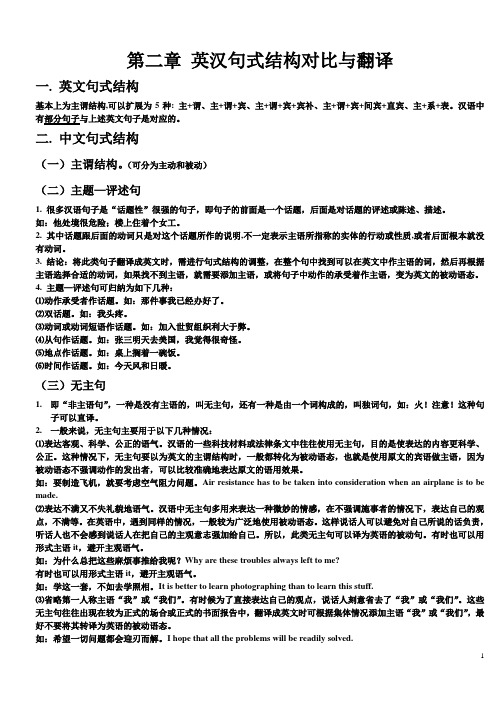
第二章英汉句式结构对比与翻译一. 英文句式结构基本上为主谓结构,可以扩展为5种: 主+谓、主+谓+宾、主+谓+宾+宾补、主+谓+宾+间宾+直宾、主+系+表。
汉语中有部分句子与上述英文句子是对应的。
二. 中文句式结构(一)主谓结构。
(可分为主动和被动)(二)主题—评述句1. 很多汉语句子是“话题性”很强的句子,即句子的前面是一个话题,后面是对话题的评述或陈述、描述。
如:他处境很危险;楼上住着个女工。
2. 其中话题跟后面的动词只是对这个话题所作的说明,不一定表示主语所指称的实体的行动或性质,或者后面根本就没有动词。
3. 结论:将此类句子翻译成英文时,需进行句式结构的调整,在整个句中找到可以在英文中作主语的词,然后再根据主语选择合适的动词,如果找不到主语,就需要添加主语,或将句子中动作的承受着作主语,变为英文的被动语态。
4. 主题—评述句可归纳为如下几种:⑴动作承受者作话题。
如:那件事我已经办好了。
⑵双话题。
如:我头疼。
⑶动词或动词短语作话题。
如:加入世贸组织利大于弊。
⑷从句作话题。
如:张三明天去美国,我觉得很奇怪。
⑸地点作话题。
如:桌上搁着一碗饭。
⑹时间作话题。
如:今天风和日暖。
(三)无主句1.即“非主语句”,一种是没有主语的,叫无主句,还有一种是由一个词构成的,叫独词句,如:火!注意!这种句子可以直译。
2.一般来说,无主句主要用于以下几种情况:⑴表达客观、科学、公正的语气。
汉语的一些科技材料或法律条文中往往使用无主句,目的是使表达的内容更科学、公正。
这种情况下,无主句要以为英文的主谓结构时,一般都转化为被动语态,也就是使用原文的宾语做主语,因为被动语态不强调动作的发出者,可以比较准确地表达原文的语用效果。
如:要制造飞机,就要考虑空气阻力问题。
Air resistance has to be taken into consideration when an airplane is to be made.⑵表达不满又不失礼貌地语气。
英汉语对比与翻译

There isn’t much to live for in this jail of a house. (Charles Dickens) 住在这监狱一样的房子里,活着没有多大 意思。 My fool of a doctor told me to make my will. (John Galsworthy) 我那笨蛋医生叫我写遗嘱。
Lecture One
Comparison between English and Chinese vs. Translation
引子
There
isn’t much to live for in this jail of a house. He was open now to charges of willful blindness. 人不犯我,我不犯人。 我走在厚厚的地毯上,一点脚步声也没 有。 一匹马骑两个人。 他赢得起,输不起。 沉鱼落雁之容,闭月羞花之貌
C-E: from personal to impersonal
一看到那棵大树,我便想起了童年的情景。 The sight of the big tree always reminds me of my childhood. 近来忙于其他事务,未能早些复信,深感抱 歉。 I am very sorry that the pressure of other occupations has prevented me from sending an earlier reply to your letter.
汉语动词常常重复或重叠
说是的说是,说非的说非,莫衷一是。 Some say “yes” and others say “no”; I don’t know whom to follow. 说说笑笑,跑跑跳跳,孩子们过得十分愉 快。 Talking and laughing, running and jumping, the children had a good time.
翻译材料_第五章_英汉句子对比与翻译

第五章英汉句子对比与翻译第一节英汉在连贯方式上的“形合”与“意合”连贯是句子依据合理的语义和逻辑关系,恰当地连为一体的语篇特征,但在重意合的汉语中,这种特征往往隐含在上下文中,呈“隐性”状态,但这并不妨碍汉语读者对其阅读和理解,因为汉语是依靠语篇的语境意义来弥补其在逻辑和连贯方面的不足,而英语语篇中的逻辑和连贯关系则表现出“显性”的特征,既它的逻辑和连贯关系是通过外在的形式,既词法和句法结构来体现的,因此,在翻译过程中,译者就应该注意这种“隐性”和“显性”之间的转换。
翻译练习:1)We crossed the Y angtze and arrived at the station, where I bought a ticket while he saw to myluggage… At the sight of his back tears started to my eyes, but I wiped them hastily so that neither he nor anyone else might see them.2)As the weather was getting better, we decided to go for an outing the next day.3)Three month later, when he had spent all his five dollars, he felt obliged to climb onto slow-goingfreight trains, despite the police’s pursuits or arrests.4)It was only his legendary travel experiences, especially the experiences of his visit to the northern partof Shaanxi Province 60 years ago that determined his lifetime cause, thus closely connoting his life with the Chinese revolution.第二节英汉在语义层次表达上的“形合”和“意合”进行英汉对比研究的学者们常将英语句子比作树木结构,将汉语的句子比作竹子结构。
英汉句式对比与翻译

of the total population of the earth, China plays in world
affairs a role that can only grow more important in the
years ahead.
-- Jimmy Carter
Trunk line: S + V + (O) Branches and sub-branches : Adverbials and attributes
• 这样的英语句子,结构显得过于松散了,变成汉式英语而非典型地道的英语句子了。
为什么会这样呢?
• 英汉句子的差异:形合与意合 • 这种差异在翻译中给译者带来一定的障碍。将一个重形合的
语篇译成重意合的语篇,最常见的错误就是将形合的特点迁 移(transfer)到重意合的语言中。 • 翻译中译者面临的困难很多,但句型结构的迁移是最大的障 碍。现在不少译者的译文充斥着英语的句法结构,甚至还美 其名曰“忠实于原文”,这种观念实在有害。
• 英语的结构性就很明显,如:
• It is a curious fact, of which I can think of no satisfactory
explanation, that enthusiasm for country life and love of
• Because there is a great distance and there are not enough transport facilities, the rural world is isolated. This isolation has become more serious because there are not enough information media.
英汉句子比较与翻译

01
傅雷:东方人与西方人的思维方式有基本分歧,我人重综合,重归纳,重暗示,重含蓄;西方人则重分析,细微曲折,挖掘唯恐不尽,描写唯恐不周。
汉语学家王力:西洋语法是硬的,没有弹性;中国语法是软的,富有弹性。……所以中国语法以达意为主。 英国人写文章往往化零为整,而中国人写文章却往往化整为零。
1
2
3
5
这个问题必须予以处理。
6
This matter must be dealt with.
7
无被动助词
1
看似主动,但在主谓关系上却有被动含义,这种语言现象在汉语中大量存在。
2
例句:
3
那里讲什么语言?
4
What language is spoken there?
5
这个任务必须按时完成。
6
This task must be fulfilled in time.
There is nothing wrong with this computer.
这台电脑没有什么毛病。
2 –ible, -able 结尾的形容词作定语,与every, the only或形容词最高级连用来修饰一个名词时,也常需后置。 The doctors have tried every way possible. 大夫们已经试过各种可能的办法了。 They had the greatest difficulty imaginable getting there in time. 为了能及时赶到那儿,他们克服了极大的困难。 It is the only wild berry edible here in this area. 它是这个地区惟一能食用的野莓。
I worked very hard on this book.
英汉语言对比

英汉语 言对比
静态与 动态
形合与 意合
树状与 竹状
主语与主题
试比较以下的汉英句子,你有什么发现?
只要用功读书,就能提高成绩。 If one studies hard enough, one will … 国庆节七天我们第一天全家人北京路购物。 On the first day of the seven-day National Day holiday, our whole family … 刮风了,下雨了。 It is windy and rainy.
主语与主题
现在请大家通过翻译一下的简单句子掌握这一技巧。 1.I would not believe what he said. 他的话,我可不信。 2.I did not remember a single point discussed at the meeting. 会上讲了什么,我一点也没记住。 3.He is the best singer. 唱歌,他是最棒的。
形合与意合
思考:汉语也 和英语一样具 有基本句型吗?
形合与意合
在不同语言中,句子内部连接或者外部连接几乎都是用三 中手段:句法手段(Syntactic),词汇手段(Lexical equivalence)和语义手段(Semantic connection)。用前两种手段 连接成为形合(hypotaxis),用后一种手段连接成为意合 (parataxis)。 英语句法结构重形合,句中各个成分的相互结合常用适当 的连接词语,以表示其结构关系。 汉语句法结构重意合,句中各个成分的相互结合多依靠语 义的贯通,语境的映衬,少用连接词语。
英汉语言对比及翻译
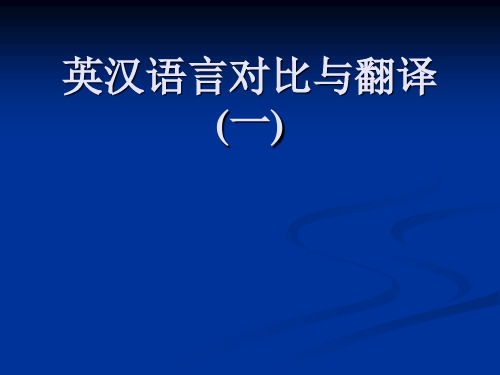
思果说:“千万不能跟英文走。” 2
1.刘宓庆.翻译与语言哲学[M].北京:中国对外翻译出版公司,2001: 78.)
2.思
果. 翻译研究[M]. 北京:中国对外翻译出版公司, 2001:23)
汉语的线性序列 与英语的空间结构
关于英汉语言的比喻
英语句子的结构: “葡萄藤型”结构 (grapevine structure),意为在短短的主 干上派生出长长的枝蔓和丰硕的果实;
1. 怒安. 傅雷谈翻译[M]. 沈阳:辽宁教育出版社2005:30
翻译中英汉语言对比的重要意义
就保留原文句法与译文体现原作精神 的问题,傅雷也有精辟的论述:“假如破 坏本国文字的结构与特性,就能传达 异国文字的特性而获得原作的精神, 那么翻译真是太容易了。不幸那种理 论非但是刻船求剑,而且结果是削足 就履,两败俱伤。” 1
英汉语言对比与翻译 (一)
翻译中英汉语言对比的重要意义
Jean Delisle, representative of French Interpretative Theory of Translation, says in his Translation: An Interpretive Approach, “In other words, each community has developed habits of expression that, over time, have been integrated into the language and lent it certain characteristics.”1
1. 怒安. 傅雷谈翻译[M]. 沈阳:辽宁教育出版社2005:2
翻译中英汉语言对比的重要意义
刘宓庆:“西方各语种在SLT与TLT之间的 实现形式转换的可行性比汉外翻译大得 多。……即既实现意义对应,又实现形式对 应。这在汉语与西方语言之间的转换中是根
英汉语语句联接关系的对比及在翻译中的转换

英汉语语句联接关系的对比及在翻译中的转换英汉语语句联接关系的对比及在翻译中的转换:一、并列关系英文表达时较为普遍,中文中也有此类表达方式。
使用“和”、“以及”、“并且”等词语,表示紧密的连续关系,对于完整句子的理解和翻译至关重要。
示例:英文:I went to the library and borrowed some books.中文翻译:我去了图书馆并借了一些书。
二、转折关系英语中常用的转折关系相关词语有“but”、“however”、“although”等,在句子中扮演着“承前启后”的作用。
而在中文中则大多使用介词“但是”、“然而”、“尽管如此”等,为句子衔接提供一定的语境。
示例:英文:He is very talented, but he lacks discipline.中文翻译:他非常有才华,但缺乏纪律性。
三、因果关系英文中因果关系的表达较为丰富,包括“because”、“since”、“as a result”等,通过对句子的组织来体现行为之间的联系。
在中文中,一般使用“因为”、“由于”、“所以”等来表示所述行为的原因和目的。
示例:英文:She was late because the train was delayed.中文翻译:她迟到了是因为火车晚点了。
四、对比关系对比关系常常用于表述相对性的概念,英文中的表达方式较为丰富,如“although”、“whereas”、“while”等。
在中文中,也有“虽然”、“然而”等表达方式来加深对比关系的理解。
示例:英文:He is rich, while I am poor.中文翻译:他很富有,而我很贫穷。
五、条件关系英文中规定、保证句式等表达方式为条件关系,包括“if”、“provided that”、“as long as”等。
在中文中一般使用“如果”、“只要”等分句方式来表达条件关系。
示例:英文:If it rains, we will stay inside.中文翻译:如果下雨,我们会呆在室内。
翻译-英汉语言对比

小组成员:周洁 邱文姿 周雯 徐倩倩 戴文君 丁家华
1. 主语与主题
英语的特点是主语突出 subject-prominent
“主语突出”是指在该语言里主语和谓语这两 个语法成分是句子的基本结构,句子中通常都 有“主语—谓语”结构(即SV结构)。
It is the time for class.
句子之间依靠各种关系词(介词、关系代 词、关系副词、连接词)来过渡和连接, 往往形成长句。
例1:
The boy, who was crying as if his heart would break, said, when I spoke to him, that he was very hungry because he had had no food for two days.
英语——形合
重词形与句法,语言中有明显的逻辑 关系,强调形式上紧密结合,结构完 整。主要采用句法手段和词汇手段。 句间常用连接词语。
汉语——意合
重直觉,强调意念流,强调意识上结 合紧密。语法意义和逻辑关系常隐藏 在字里行间。主要使用语义手段,多 依靠语义的贯通,语境的映衬,少用 连接词语。
例:
上梁不正下梁歪 If the upper beam in not straight, the lower ones will go aslant.
例2:
昨天的事多亏你帮忙。
参考译文: Thank you for your help yesterday.
2. 形合与意合
形合 (hypotaxis):
借助语言形式手段来实现词语或句子的连接(包括 句法手段和词汇手段)
意合(parபைடு நூலகம்taxis):
03.英汉语言对比

英汉语言对比
Comparative Studies of English and Chinese Languages
课堂互动1: 翻译句子,注意语序、语态特点(参考译文)
1.I suppose that if a man has a confused mind he will write in a confused way, if his temper is capricious his prose will be fantastical, and if he has a quick, darting intelligence that is reminded by the matter in hand of a hundred things, he will, unless he has great self-control, load his pages with metaphor and simile.
【译文】这地方实在漂亮,所以许多人都把自己的家 小搬来居住。
12 返回章重点 退出
课堂互动3: 翻译句子,注意句子的结构转换(参考译文)
5.The music world and the world at large became poorer places on April 8, when Marian Anderson, the greatest alto from Philadelphia, died at 96. (按照时间顺序)
【译文】他心中的所谓文化,与人的精神心灵有关,不 能用物质的丰富,甚至艺术文明来衡量。他跟东方 人交往很久,也同情东方人;在东方人心目中,文 化也是如此。
5 返回章重点 退出
课堂互动1: 翻译句子,注意语序、语态特点(参考译文)
第六讲+英汉句子比较与翻译2

1 名词从句的翻译
e. The problem is that people failed to detect massive changes. 问题是人们没有发现大量的变化。 (顺译)
2.形容词性从句的翻译策略
形容词性从句指定语从句,在句中起到形 容词的作用,修饰或说明与之相关的先行 词。定语从句与先行词的关系紧密,汉语 翻译中可以灵活考虑应用不同方法来处理, 如译成前置定语、拆分、融合、转译等。 如:
b. I started to explain that I could not do my best since my spectacles had been taken away from me, but she wouldn't let me finish. 我开始解释,我无法发挥最佳状态,因为 我的眼镜给/被人拿走了,但她不准我讲完。
b). Many centuries had passed before man learned to make fire
几个世纪过去了,人类才学会取火。
c). Many people will come down with the disease, and they will die before vaccine can be distributed.
a.你能回答一个使我弄不懂而又想问你的问题吗? b.我有一个问题弄不懂,想请教你,你能回答吗?
1 名词从句的翻译
英语名词从句包括主语从句、宾语从句、表语 从句、同位语从句等。在汉语翻译过程中, 1.基本可以英文原有语序来组织汉语表达, 2. 也有些变通方法,调整前后小句的次序, 或改变原从句在整个句子中的作用。如:
英汉句式结构的差异及翻译
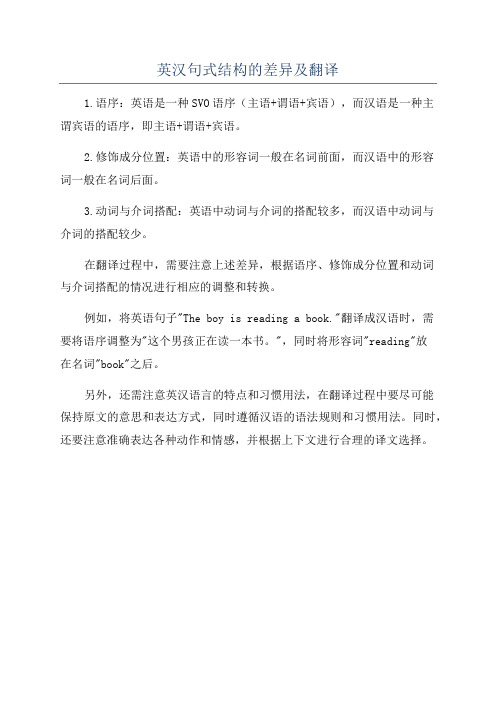
英汉句式结构的差异及翻译
1.语序:英语是一种SVO语序(主语+谓语+宾语),而汉语是一种主
谓宾语的语序,即主语+谓语+宾语。
2.修饰成分位置:英语中的形容词一般在名词前面,而汉语中的形容
词一般在名词后面。
3.动词与介词搭配:英语中动词与介词的搭配较多,而汉语中动词与
介词的搭配较少。
在翻译过程中,需要注意上述差异,根据语序、修饰成分位置和动词
与介词搭配的情况进行相应的调整和转换。
例如,将英语句子"The boy is reading a book."翻译成汉语时,需
要将语序调整为"这个男孩正在读一本书。
",同时将形容词"reading"放
在名词"book"之后。
另外,还需注意英汉语言的特点和习惯用法,在翻译过程中要尽可能
保持原文的意思和表达方式,同时遵循汉语的语法规则和习惯用法。
同时,还要注意准确表达各种动作和情感,并根据上下文进行合理的译文选择。
英汉句子比较与翻译

• 英语:end-weight头轻脚重,属于主 语显著(subject-prominent)语言 • It is….to…; there… • 英语重视主语的位置及其统帅全局的作 用。因此在汉译英中,如何找准句子重 心,确定主语常常是翻译成败的关键因 素。
• 汉语:头重脚轻,属于主题显著 (topic-prominent)语言 • 语言学家赵元任:在汉语中,主语与谓 语之间的语法关系与其说是施事和动作 的关系,不如说是话题和说明的关系, 施事和动作可以看作是话题和说明的一 个特例。
• Inadequate training for farmers and the low productivity of many farms place the majority of country dwellers in a disadvantageous position in their own countries. • 农民缺乏训练,许多农场生产率很低, 这就使得大多数农民处于贫穷的境地。
• 英语句子中,名词与介词占优势 英语句子中, • 主谓机制:抓住了谓语动词就抓住了英 语句子的灵魂。 • 名词与名词之间的联系要借介词来串通
• Carlisle Street runs westward, across a great black bridge, down a hill and up again, by little shops and meat-markets, past single-storied homes, until suddenly it stops against a wide green lawn. (7个介词) • 卡莱尔大街往西伸展,越过一座黑色大 桥,爬下山岗又爬上去,经过许多小铺 和肉市,又经过一些平房,然后突然朝 着一大片绿色草地中止了。
浅谈英汉句子结构比较与翻译

- 224 -校园英语 /浅谈英汉句子结构比较与翻译郑州升达经贸管理学院外语系/惠凯赟 田倩倩【摘要】本文从实用的角度,认为英汉两种语言的句子结构常式不同。
英语句子是语法的,语法结构常式为三分,即SVO,汉语句子是语义的,语义结构常式为两分,即TC(话题和说明)。
通过英汉句子结构的比较,通过实例说明在英汉互译中灵活运用句子结构,可以在翻译中做到目的语的通顺,有利于翻译目的达成。
【关键词】句子结构 语法 语义 翻译有研究表明,虽然现在世界上有许多不同的语言,但是最早的原始语结有可能是一样的。
在各民族漫长的历史长河中,语结有不同的分化方式,就造成了语言的多种多样。
原始语结可以分化为行为、实行者、受施者,印欧语系的语言基本上都是这样。
原始语结也可以分化为话题和说明。
不同的逻辑——心理结构引起了不同的分化方式,认知模式决定了逻辑——心理结构。
通过比较可以发现英汉句子结构特点不同,从中找出英汉互译的方法。
英语和汉语句子也有不同特点,有关汉英句子结构特点及其比较的文章很多,这里综合各家之说,英汉语从宏观结构上看,其区别特征有如下一些。
一、大树型与竹竿型英语句子是三分结构,特点是:主谓搭架,枝叶上挂,结构严谨,注重语法。
英语句子主谓搭架枝叶上挂,它可以带有很多从句。
汉语句子是两分结构,特点是:话题说明,可减可增。
注重语意,把握整体。
所谓整体,可指上下文,也可指文章的背景。
汉语句子较短,一个短句接一个短句。
我们的习惯说法是英语如参天大树,枝繁叶茂,汉语如长江波涛,汹涌向前。
由此而引出汉译英的理论和技巧:意合变形合,隐性变显性,找出中心成分,增加关联词语。
总之,英译汉时把大树变成竹竿,汉译英时要把竹竿变为大树。
在《实用汉英翻译教程》中有个例子能说明这个特点,译者把“有些人认为这个词起源于一个苏格兰词,意为‘厉害’、‘聪明’。
译为:A number of people believe that it came from Scottish word meaning sharp and clever.两种语言的造句规律有很大不同,翻译过程中目的语总会受到原语的影响,所以还是不能还原为原来的样子,名词后边的内容都放到名词前边。
英汉句子结构比较与翻译
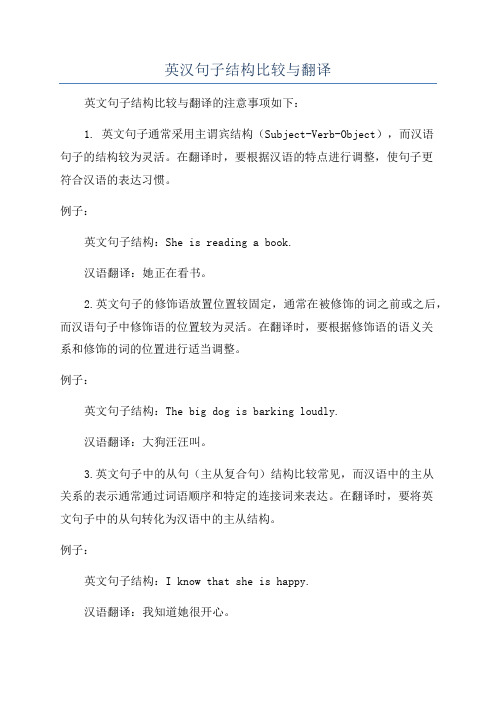
英汉句子结构比较与翻译
英文句子结构比较与翻译的注意事项如下:
1. 英文句子通常采用主谓宾结构(Subject-Verb-Object),而汉语
句子的结构较为灵活。
在翻译时,要根据汉语的特点进行调整,使句子更
符合汉语的表达习惯。
例子:
英文句子结构:She is reading a book.
汉语翻译:她正在看书。
2.英文句子的修饰语放置位置较固定,通常在被修饰的词之前或之后,而汉语句子中修饰语的位置较为灵活。
在翻译时,要根据修饰语的语义关
系和修饰的词的位置进行适当调整。
例子:
英文句子结构:The big dog is barking loudly.
汉语翻译:大狗汪汪叫。
3.英文句子中的从句(主从复合句)结构比较常见,而汉语中的主从
关系的表示通常通过词语顺序和特定的连接词来表达。
在翻译时,要将英
文句子中的从句转化为汉语中的主从结构。
例子:
英文句子结构:I know that she is happy.
汉语翻译:我知道她很开心。
4.英文句子中的倒装结构(句子主语和谓语动词的位置颠倒)较为常见,而汉语中的倒装结构较少使用。
在翻译时,要根据汉语的语法规则进行调整或转换。
例子:
英文句子结构:Not only did she pass the exam, but she also got the highest score.
汉语翻译:她不仅考试通过了,而且还得到了最高分。
总之,翻译英文句子时,要注意句子结构的差异,灵活运用汉语的表达习惯和语法规则,使翻译后的句子更符合汉语的语言特点。
英汉对比与翻译(好)

Part Two
A Contrastive Study of English and Chinese
英汉语对比研究
Difference Between
Comparative Study and Contrastive Study
will do it well. 支农惠农政策不断加强。 Policies were constantly strengthened to support and
benefit agriculture. 必须采取措施在石油资源耗尽之前开发新能源。 Measures must be taken to develop new energy resources
Examples of Negative Transfer
6. -- Your English is wonderful. -- Oh, no. My English is still poor. -- Your English is wonderful. -- Thank you, but I still have a long way to go before I really master it.
have stopped hunting for him.
Please compare the underlined words:
不要人云亦云。 这件事,你做也好,
他做也罢,我看谁 都做不好。
Don’t say what others have said.
Whether you do it or he does it, I’m afraid neither will do it well.
英汉语言翻译的比较
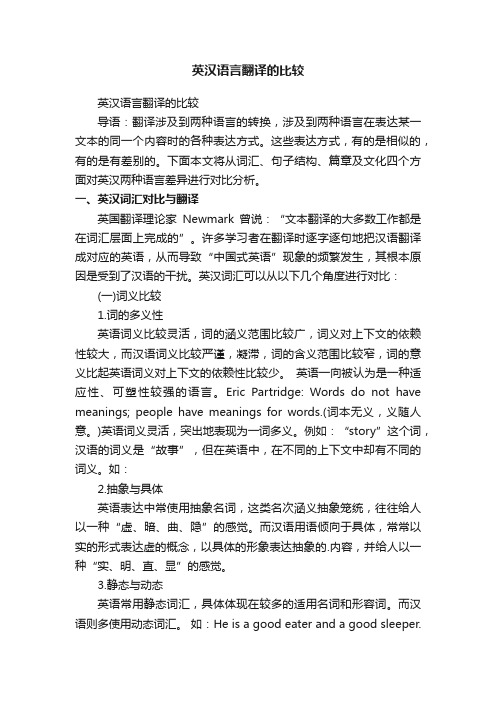
英汉语言翻译的比较英汉语言翻译的比较导语:翻译涉及到两种语言的转换,涉及到两种语言在表达某一文本的同一个内容时的各种表达方式。
这些表达方式,有的是相似的,有的是有差别的。
下面本文将从词汇、句子结构、篇章及文化四个方面对英汉两种语言差异进行对比分析。
一、英汉词汇对比与翻译英国翻译理论家Newmark曾说:“文本翻译的大多数工作都是在词汇层面上完成的”。
许多学习者在翻译时逐字逐句地把汉语翻译成对应的英语,从而导致“中国式英语”现象的频繁发生,其根本原因是受到了汉语的干扰。
英汉词汇可以从以下几个角度进行对比:(一)词义比较1.词的多义性英语词义比较灵活,词的涵义范围比较广,词义对上下文的依赖性较大,而汉语词义比较严谨,凝滞,词的含义范围比较窄,词的意义比起英语词义对上下文的依赖性比较少。
英语一向被认为是一种适应性、可塑性较强的语言。
Eric Partridge: Words do not have meanings; people have meanings for words.(词本无义,义随人意。
)英语词义灵活,突出地表现为一词多义。
例如:“story”这个词,汉语的词义是“故事”,但在英语中,在不同的上下文中却有不同的词义。
如:2.抽象与具体英语表达中常使用抽象名词,这类名次涵义抽象笼统,往往给人以一种“虚、暗、曲、隐”的感觉。
而汉语用语倾向于具体,常常以实的形式表达虚的概念,以具体的形象表达抽象的.内容,并给人以一种“实、明、直、显”的感觉。
3.静态与动态英语常用静态词汇,具体体现在较多的适用名词和形容词。
而汉语则多使用动态词汇。
如:He is a good eater and a good sleeper.他能吃又能睡。
4.构词法(1)英语主要构词法有派生、转化和合成三种,汉语主要有派生、转化、合成、重叠四种。
(2)英语派生可用于名词、动词、形容词等,汉语派生只用于名词。
(3)重叠是汉语主要构词法之一,英语则无重叠法。
英汉句法结构对比与翻译
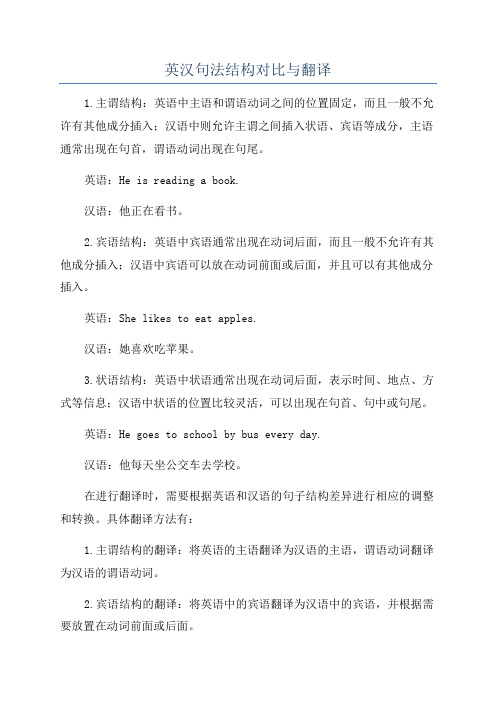
英汉句法结构对比与翻译
1.主谓结构:英语中主语和谓语动词之间的位置固定,而且一般不允许有其他成分插入;汉语中则允许主谓之间插入状语、宾语等成分,主语通常出现在句首,谓语动词出现在句尾。
英语:He is reading a book.
汉语:他正在看书。
2.宾语结构:英语中宾语通常出现在动词后面,而且一般不允许有其他成分插入;汉语中宾语可以放在动词前面或后面,并且可以有其他成分插入。
英语:She likes to eat apples.
汉语:她喜欢吃苹果。
3.状语结构:英语中状语通常出现在动词后面,表示时间、地点、方式等信息;汉语中状语的位置比较灵活,可以出现在句首、句中或句尾。
英语:He goes to school by bus every day.
汉语:他每天坐公交车去学校。
在进行翻译时,需要根据英语和汉语的句子结构差异进行相应的调整和转换。
具体翻译方法有:
1.主谓结构的翻译:将英语的主语翻译为汉语的主语,谓语动词翻译为汉语的谓语动词。
2.宾语结构的翻译:将英语中的宾语翻译为汉语中的宾语,并根据需要放置在动词前面或后面。
3.状语结构的翻译:将英语中的状语翻译为汉语中的状语,并根据需要放置在句首、句中或句尾。
需要注意的是,不仅要考虑句子结构的差异,还要考虑语言的习惯表达方式和上下文的语境。
对于复杂的句子结构和长篇文章的翻译,还需要进行更加细致的分析和翻译。
- 1、下载文档前请自行甄别文档内容的完整性,平台不提供额外的编辑、内容补充、找答案等附加服务。
- 2、"仅部分预览"的文档,不可在线预览部分如存在完整性等问题,可反馈申请退款(可完整预览的文档不适用该条件!)。
- 3、如文档侵犯您的权益,请联系客服反馈,我们会尽快为您处理(人工客服工作时间:9:00-18:30)。
英汉句子重心的差异 汉语的习惯是叙事在前,表态在后。 英语的习惯是表态在前,叙事在后。
We believe that it is right and necessary that people with different political and social systems should live side by side—not just in a passive way but as active friends. 我们认为生活在不同政治社会制度下的各国人民 应该共处,不仅仅是消极共处,而是要积极地友 好相处,这是正确而必要的。
2)汉语无主句 用来表达观点、态度、要求、告诫、号召等 例句: 应该教育儿童说实话。 Children should be taught to speak the truth. 发现了错误,一定要改正。 Wrongs must be righted when they are discovered.
静态与动态
英语倾向于多用名词,因而叙述呈静态 (static);汉语倾向于多用动词,因而叙述呈 动态(dynamic) 英语句子中,名词与介词占优势 英语句子的静态趋向主要体现在句法的名词化 He failed in this exam, so he felt disherateded. His failure in the exam made him disheartened.
The visit gives me the opportunity which I have long sought, to see for myself the achievements of the Chinese people. 这次访问使我有机会亲眼看一看中国人民取得的成 就,这是我向往已久的。 I am heartened by the assurance which your Government has repeatedly given that the arrangements for Hong Kong contained in the Agreement are not measures of expediency. 贵国政府一再表示,协议中有关香港的安排不是权 宜之计,这种保证使我感到鼓舞。
5 出于礼貌,使措辞得当,语气委婉 Visitors are requested to show their tickets. 来宾请出示入场券。 Passengers are requested to fill in the customs declaration form here. 请旅客在此填写报关表。
二十岁那年,我就逃出了父亲的家庭。直到现在还 是过着流浪的生活。 (萧红 《永久的憧憬和追 求》) When I was twenty, I fled home. Since then I have been wandering around like hobo. (刘士聪 译)
英汉语言语序上的差异
2 动作的对象是谈话的中心话题 Clinton is expected to give his testimony by videotape. 克林顿将会以录像的形式提供证词。 The scientific research plan has already been drawn up. 科研计划已经拟出来了。 The girl was criticized yesterday. 这个女孩昨天挨了一顿批评。
汉语的被动态 1 有形式标记的被动态 2 无形式标记的被动态
1 有形式标记的被动态 表被动意义的助词 让,叫,给,被,受,挨,遭,由,加以,予以,为……所,被…… 所,是…..的 例句: 工作已由他完成了。 The work has been done by him. 杯子给打得粉碎。 The cup has been broken into pieces. 这个问题必须予以处理。 This matter must be dealt with.
汉语句子中,动词占优势 《红楼梦》:晴雯先接出来,笑道:“好啊, 叫我研了墨,早起高兴,只写了三个字,扔 下笔就走了,哄我等了这一天,快来给我写 完了这些墨才算呢!”
Ford’s first pledge was, ―Mr. President, you have my support and my loyalty.‖ 福特一开始就保证说:“总统先生,我支持 您, 并效忠于您。”
例句:
If winter comes, can spring be far behind? 冬天来了,春天还会远吗? I want to dance with a girl who is from Memphis and who has a Southern accent. 我想同一位有南方口音的孟菲斯姑娘跳舞。
主语与主题
英语:end-weight头轻脚重,属于主语显著 (subject-prominent)语言 汉语:头重脚轻,属于主题显著(topic-prominent) 语言
例: 家里的事情,你不用管,你干你的正经事去。 这袋米三个人吃。 会议室里正在开会。
I worked very hard on this book. 这本书我花了很多心血。 He isn’t interested in things like watching TV, listening to songs, or dancing. 看电视、唱歌、跳舞这类活动他都不感兴趣。 A dialect is known by every linguist in this room. 有一种方言这间屋子里的每一个语言学家都懂得。 You don’t grow the grain you eat and you don’t make the clothes you wear. 你吃的粮食不是你自己种的,你穿的衣服也不是你 自己做的。
2 无形式标记的被动态 无被动助词 1)看似主动,但在主谓关系上却有被动含 义,这种语言现象在汉语中大量存在。 例句: 那里讲什么语言? What language is spoken there? 这个任务必须按时完成。 This task must be fulfilled in time.
2. –ible, -able 结尾的形容词作定语,与every, the only或形容词最高级连用来修饰一个名词时,也常 需后置。 The doctors have tried every way possible. 大夫们已经试过各种可能的办法了。 They overcame the greatest difficulty imaginable getting there in time. 为了能及时赶到那儿,他们克服了极大的困难。 It is the only wild berry edible here in this area. 它是这个地区惟一能食用的野莓。
Carlisle Street runs westward, across a great black bridge, down a hill and up again, by little shops and meat-markets, past single-storied homes, until suddenly it stops against a wide green lawn. (7个介词) 卡莱尔大街往西伸展,越过一座黑色大桥,爬下山 岗又爬上去,经过许多小铺和肉市,又经过一些平 房,然后突然在一大片绿色草地旁中止了。 Inadequate training for farmers and the low productivity of many farms place the majority of country dwellers in a disadvantageous position in their own countries. 农民缺乏训练,许多农场生产率很低,这就使得大 多数农民处于贫穷的境地。
主要差异集中在定语和状语的位置上。 定语后置 1. some-, any-, every-, no等构成的复合代词 He told me something important. 他告诉我一件重要的事情。 There is nothing wrong with this computer. 这台电脑没有什么毛病。
4 为了加强上下文的连贯、衔接 John actually loved Mary and was loved in return. 约翰真的爱玛丽,而玛丽也爱约翰。 He appeared on the stage and was warmly applauded by the audience. 他出现在台上,观众热烈鼓掌欢迎。 Language is shaped by, and shapes, human thought. 人的思想形成语言,而语言又影响了人的思想。
英汉时态差别
英语时态的汉译 汉语主要通过词汇和句法手段来表示“时” 的变化,如用“了”、“着”、“过”、 “已经”、“就要”、“现在”、“将来”、 “正在”、“过去”等 英语时态必须用动词的曲折变化体现出来 (work—worked /working)
When he has taken his exercise and is drinking his tea or his beer, and lighting his pipe… (George Santayana, The Weather in His Soul) 当他在运动之余品茶或喝酒,并点着烟斗时…… (刘士聪 译)
3 无从说出动作的实行者是谁 She was seen to go out of the room. 人家看见她走出了那个房间。 You’re wanted on the phone. 你的电话。 This rubbish is being disposed of. (有人)正在处理这些垃圾。
